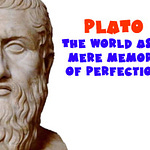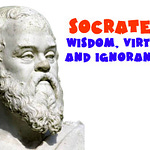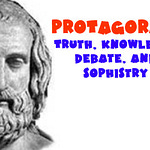This video is available to everyone for a limited time. Paid subscribers will have access to this and all other videos and bonus content. Please consider upgrading to a paid subscription to enjoy and support this project. If you pay to subscribe I’ll also read your name out at the end of the video.
You can also obtain the benefits of a paid subscription by sharing Three Minute Philosophy with others. For each new friend you bring in, you earn benefits. So spread the word!
For the full archive of videos so far, visit https://www.speterdavis.com/philosophy/
Aristotle was a Greek philosopher who lived around 380 BC and is often regarded to be one of the greatest who ever lived. In fact the only other philosopher commonly regarded to be just as good is Plato, which makes sense, because Plato was Aristotle’s teacher.
Like Plato, he was incredibly prolific and didn’t specialize in any one thing, being known for his work on ethics, metaphysics, political theory, rhetoric, literary theory, medicine, theology and science. It’s said that he knew more than anyone who ever lived, although to be fair, many of his statements later turned out to be false in such a way as could be corrected if Aristotle had simply looked. For example, that mayflies have four legs and women have fewer teeth than men.
Nevertheless he can be credited with some very important contributions to philosophy such as the development of formal logic.
Although philosophers had been using logical and mathematical reasoning for a long time, Aristotle’s contribution was a form of deductive logic known as a syllogism, which is a way of figuring out new information from previously verified facts. For example:
All birds can fly,
A pigeon is a bird,
A pigeon can fly.
This is a syllogism because if the first and second premise are both true, then the third statement, the conclusion, is true by necessity.
If however, one of the premises is not correct, for example it turns out that not all birds can fly, then the conclusion is not necessarily true. But this does not necessarily mean that the conclusion is false.
For something to be a proper syllogism the first two statements must be true and the conclusion must follow from them. For example you can’t say:
All birds can fly,
Superman can fly,
Superman is a bird.
Since the first phrase didn’t say “only birds can fly,” the conclusion doesn’t follow from the premises, so it’s not a syllogism, it’s not anything, it’s just wrong.
For Aristotle, every statement that can be said about the world is either true or false. You can only have one or the other. Although this sounds perfectly reasonable, Aristotle nevertheless ran into a problem. Namely, the truth value of future statements.
If I say that a coin flip is going to come up heads and then it does, then it’s tempting to say that my statement was true, but if you said it was going to be tails does that mean you were wrong? Were you lying?
Aristotle was uncomfortable with this because if a prediction I make about the future is true when it happens then it must have been true when I said it, and it would still have been true if I said it a thousand years ago, because facts about events don’t change over time. But this implies that the future is set in stone which raises uncomfortable questions about free will.
Aristotle’s solution was to suggest that future events are neither true nor false because they haven't happened yet. But this presents its own problem because if you say the coin will flip heads, and it does, and you say you were right, I can't very well say no you weren't.
Although Aristotle was a student of Plato, he fundamentally disagreed with Plato's Theory of Forms. While Plato believed that all individual things were but a shadow of the most perfect example of that thing, Aristotle figured that Plato's forms can't be very good examples at all if they didn't exist anywhere in the world.
So he took a different approach and claimed that everything in the world can be analysed in terms of two types of features: Incidental features, and essential features.
An incidental feature is any feature that doesn't affect something's placement in a category, for example, a fish can be red or blue, big or small, but despite these differences, it's still a fish. On the other hand, an essential feature is any aspect of something that is necessary for it to be that thing. For example, a fish that has no fins, no gills, doesn't live in water, has fur and whiskers, drinks milk, and is named Archimedes von Pussyboots definitely is not a fish.
Taken together, Plato and Aristotle compose the magnum opus of Greek philosophy, and Aristotle was so learned that the king of Macedon hired him to teach his son. That kid grew up to be Alexander the Great, and he went on to destroy a lot of stuff and kill a lot of people, so you win some and you lose some.
Sources:
Adamson, Peter., Classical Philosophy: A history of philosophy without any gaps. Oxford University Press, 2014
What you get for subscribing:
Three Minute Philosophy is a fun and educational series of videos and essays about the history of philosophy.
Essays are free. Paid subscribers will gain access to full videos, printable PDFs, and possibly more in time.













Share this post